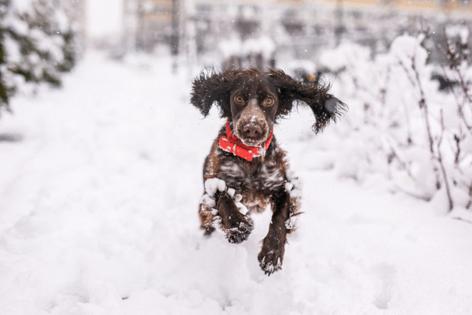Winter is coming: Tips to prepare for the cold and keep your dog safe
Published in Cats & Dogs News
As the winter season is creeping up on us, chances are your dog can feel the change in weather too! As responsible pet owners, it is important to take extra good care of our canine companions during the winter months.
The American Kennel Club recommends the following tips for a safe winter season.
Be mindful of window drafts. Small dogs and dogs with thin coats are easily bothered by drafts in your home. Tiled and uncarpeted floors will easily get cold in the winter, so it is important to cover any uncarpeted areas with blankets or pads to keep a warm surface available for your pet. You might also consider purchasing thicker bedding to keep your pup warm.
Don’t leave your dog out in the cold. Limit the amount of time your dog spends outside as they can get hypothermia and frostbite too. Supervise your pup to ensure that no snow or ice gets stuck in between their paws, which can cause cuts or cracked paw pads. If this happens, rubbing a small amount of petroleum jelly can help soothe paw pads.
Have canine winter attire at the ready. Some dogs, especially small, hairless or short-haired dogs are more likely to feel chilly as temperatures drop. For example, if you have a Chihuahua or a miniature pinscher, it is important to invest in a winter jacket for them. Dogs' paws lack fur, so you should consider investing in a pair of winter boots for your dog.
Don’t leave your dog in the car. Though it may seem like this rule might only apply in the summer, the cold can cause the same amount of harm to your dog. Even if you’re just running a quick errand, be sure to always have your dog supervised in the car.
Rinse your dog’s paws. After a walk, it is important to rinse your dog’s paw pads. Rock salt that is used to melt ice on sidewalks can irritate your dog’s paws. Make sure to rinse and dry them after each walk. Don’t forget about the ears as well, to prevent painful ear infections.
Beware of spilled antifreeze. Antifreeze is the most common toxic substance ingested by pets during the winter months, and it can be deadly. Be on the lookout for possible antifreeze spillage on driveways or roads when out with your dog.
For more tips on responsible dog ownership, visit the AKC at www.akc.org.
©2024 American Kennel Club. Visit at akc.org. Distributed by Tribune Content Agency, LLC









Comments